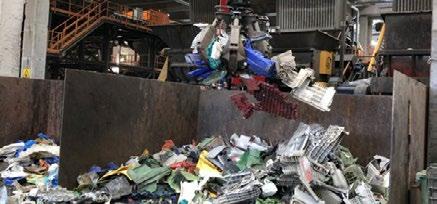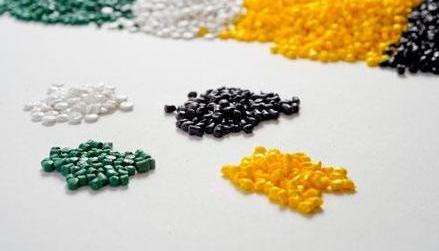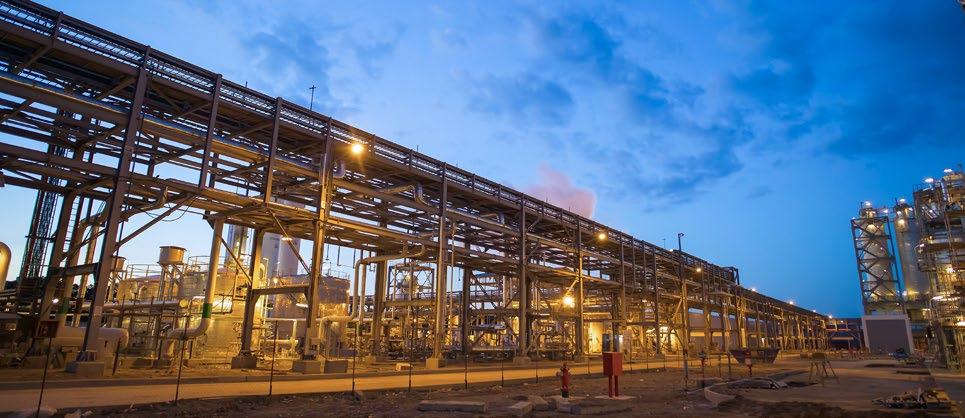
13 minute read
2.4 MAIRE TECNIMONT FOR THE CIRCULAR ECONOMY
2.4 MAIRE TECNIMONT
FOR THE CIRCULAR ECONOMY
Advertisement
Maire Tecnimont has approached the theme of the circular economy with the precise aim of applying its know-how in chemical engineering and knowledge of hydrocarbon transformation processes to a more sustainable future, based on preserving resources and limiting climate-altering emissions.
The Maire Tecnimont Group, through its subsidiary NextChem, has developed a Circular District model, whose aim is to use innovative technologies in the green chemistry sector and for recycling at the production sites used by
traditional and heavy industry. The model integrates the principles and objectives of the circular economy with those of the transition to a low-carbon economy. Our philosophy is to utilize these principles (circular economy and decarbonization) to good effect within a framework of economic and environmental sustainability.
The aim of the model is the synergistic production of high-quality recycled polymers from mechanically recyclable plastics and low-carbon chemicals, and of fuels from non-recyclable waste, while supporting the green conversion of industry (primarily refineries) by reducing its climate-altering emissions.
ENVIRONMENTAL BENEFITS OF OUR CIRCULAR DISTRICT MODEL
The new European Waste Directive has strengthened the principle of sustainable transition of the waste management cycle, in order to promote the principles of the circular economy. In particular, the Directive sets out new objectives for the recycling of urban waste: by 2025, at
least 55% (by weight) of urban
waste will have to be recycled. The development of the circular economy is one of the primary objectives of the European Union, and is also much in evidence in the guidelines of supranational bodies and in the Sustainable Development Goals. Our model contributes to the achievement of recycling and waste recovery targets by assuring the transition from a linear economy to a circular one; it allows the production not only of secondary raw materials to replace virgin ones, but also the production of an energy carrier such as hydrogen, for fuels like methanol, ethanol and high-value chemicals, which have a lower carbon content than traditional ones made from fossil fuels. Maire Tecnimont’s Green Circular District Model contributes to the decarbonization of hard-to-abate energy-intensive industries. It bolsters the efforts to mitigate the climate and environmental risks posed by the use of fossil fuels, by promoting the process of decarbonizing traditional industry, and contributes to the fulfilment of the European climate neutrality target for 2050.
INNOVATION AND THE POSITIVE SOCIOECONOMIC IMPACT OF THE GREEN CIRCULAR DISTRICT MODEL
Our model can be a benchmark for the creation of a best practice and at the same time for the creation of synergies between industrial actors in different supply chains (waste, refining, energy and distribution). Our project can help promote private investment in order to promote economic recovery in strategic green sectors and preserve jobs in at-risk supply chains and geographical regions. This will involve
reskilling and creating new employment, including jobs for young people, by training dedicated professional roles.
The project involves the realization of innovative solutions; the dissemination of know-how will also encourage the uptake of similar solutions in other industries and businesses, and it could encourage the formation of new downstream supply chains and allied industries, which will have a positive socioeconomic impact on the communities that will host the Circular Districts.
A STRATEGY FOR PLASTIC LIFECYCLE SUSTAINABILITY
The future of plastic? According to the Maire Tecnimont Group’s vision, it is sustainable. The way forward is to consider plastic waste as the oil of the new millennium. Plastic has been the subject of great mobilization in recent years, and this has rightly focused our attention on the harm caused to the environment and wildlife by dumping plastic on the ground, in rivers or in seas; it is less fair to demonize plastic as a material in any of its applications. Plastic is one of the greatest inventions of the last century. It has made a fundamental contribution to improving the quality of life and well-being of millions of people in the most vulnerable areas of the planet, and its light weight allows goods and products to circulate in a less environmentally-
impactful way. It has also allowed us to make great strides in many fields, notably in medicine, mobility and electronics.
The fundamental problem related to the sustainability of plastic is how to manage this material once
it becomes a waste product. The basic answer to this problem lies in educating consumers on the one hand, and in developing methods of recycling and waste recovery on the other, by increasing the share of recycled polymers on the market and in the mix of raw materials used in the supply chain, and by working on new ways of recovering plastic, also by chemical means. Maire Tecnimont has an extensive knowledge of the plastics and chemicals market, thanks to its decades of experience in the construction of polymer production plants all over the world. Knowing the specific needs and requirements of clients downstream of the transformation chain, Maire Tecnimont and its subsidiary NextChem have been able to work “in reverse gear”, going back up the process in order to recompose the same product from new, waste-sourced raw materials. We have grafted our expertise as chemical engineers onto this new production chain, in order to offer concrete solutions to keep plastics sustainable throughout their lifecycle.
Towards a more sustainable pro-
duction of traditional plastics. We are about to launch a project aimed at defining the points at which energy consumption and the environmental impacts of traditional polymer production plants can be optimized.
NextChem: exploring the world of
bioplastics. Bioplastics, due to their nature and composition, cannot be a future substitute for all the plastics that surround us today. However, for certain applications they may offer interesting alternatives for the partial replacement of hydrocarbon-based polymers. A NextChem subsidiary, BIO-P, is engaged in researching the production of bioplastics from innovative sources.
Quality mechanical recycling.
We have developed an upcycling technology called MyReplastTM , which produces high-quality, high-performing recycled polymers that can replace virgin plastics in many industries. The technology is installed at the Bedizzole plant in the province of Brescia, Italy, managed by the subsidiary of NextChem, MyReplast Industries. NextChem has developed a proprietary upcycling technology. It is an innovative solution that combines mechanical recycling with the chemical process in order to create new recycled products whose characteristics and properties are similar to those of fossil-based polymers. Our plastics recycling plant, one of the most advanced in Europe (95% recycling efficiency), is in the province of Brescia, Italy. The products (flakes and granule compounds), branded MyReplastTM , have been the subject of accurate classification. The product sheets are available on the website myreplastindustries.it.
Discover more about the Green Circular District
WEBSITE
THE CIRCULAR DISTRICT
RENEWABLE ENERGY
NEW PLASTIC GOODS
PLASMIX POST-CONSUMER PLASTICS RDF AND DRY FRACTIONS
UPCYCLING
QUALITY MECHANICAL RECYCLING
CHEMICAL RECYCLING ELECTROLYSIS MOBILITY INDUSTRY
GRANULATES GREEN AND CIRCULAR HYDROGEN
Watch the Green Circular District video
VIDEO
CIRCULAR CHEMICALS FROM CONVERSION OF PLASMIX AND RDF
THE NEXTCHEM MODEL FOR DECARBONIZATION BY RECYCLING
PLASTIC AND DRY WASTE
CHEMICAL CONVERSION & PURIFICATION
CIRCULAR GAS
CIRCULAR HYDROGEN
LOW CARBON INDUSTRIAL PROCESSES & MOBILITY
SUBSTITUTION OF
NATURAL FOSSIL GAS
IN INDUSTRY PROCESSES
CIRCULAR ETHANOL
BIOFUELS HEALTH CHEMISTRY
CIRCULAR METHANOL
BIOFUELS
THE BEDIZZOLE UPCYCLING PLANT
In 2020, the Bedizzole mechanical plastic recycling plant processed about 32,000 tonnes of plastic (corresponding to the average consumption of plastic by a city of about 700,000 people). If we avoid sending plastic to landfill and recycle it properly, we can avoid the emission of 1.39 kg CO2 eq. per kg of plastic, thus helping to counteract the increase in carbon dioxide emissions into the atmosphere: in 2020, the Bedizzole plant allowed a total CO2 equivalent saving of over 40 thousand tonnes.


The industrial plant, located in Brescia and inaugurated in June 2019, is considered one of Europe’s most advanced sites for the recycling of plastic waste.
Watch MyReplast Industries video
VIDEO
AGREEMENT WITH HERA FOR THE CONSTRUCTION OF AN UPCYCLING PLANT
NextChem has signed an agreement with Aliplast, a Hera Group company which is a leader in plastics collection, recycling and regeneration, to build a plant that will use our MyReplastTM technology to upcycle plastic waste into high value-added polymers. NextChem will provide the technology and EPC services. The plant – which thanks to Herambiente will run on green energy sources – will have the capacity to produce around 30,000 tonnes of polymers per year, and is the only site of its kind in Europe. The new plant will be built on land owned by the Hera Group, and will leverage the innovative MyReplastTM technology developed by NextChem. The objective of this plant is to process post-consumer plastic waste in order to obtain customized recycled products tailored to the demands of individual clients, made in accordance with the highest quality standards and with properties and characteristics similar to virgin fossil-based polymers. The plant will ensure high safety standards, and will have innovative features such as deep process automation and high digitalization for data analytics, which will also maximize energy efficiency thus producing environmental benefits.

Discover more about the MyReplastTM Upcycling technology
WEBSITE
RECYCLING OF FACE MASKS
In 2020, NextChem committed to a feasibility study to investigate the possibility of recycling the polypropylene used in Covid-19 face masks. In 2021, progress will be made on this project with a view to conducting a pilot experiment together with other research and industrial partners, in order to identify a solution to a problem whose effects are being felt worldwide.
A chemical recycling solution for hard-to-recycle plastics.
NextChem, through its subsidiary MyRechemical, has developed a Waste to Chemical and Waste to Fuels technology, whereby the input is converted into high quality chemicals and low carbon fuels such as hydrogen, methanol and ethanol. The production of circular gas through chemical conversion is a valid response to the implementation of European guidelines for the transition from a linear to a circular economy; this method allows the recovery of materials which are currently non-recyclable, as an alternative to incineration and landfills. Incinerators (including those with energy recovery) contribute substantially to CO2 emissions compared to 1990: today, on average, a high-efficiency incinerator emits about 1.35 tonnes of CO2 per tonne of incinerated waste, and under the current European ETS legislation, it does not pay for its own CO2 emissions. The EU guidelines see the role of incineration as being heavily reduced in the short term, in accordance with European energy development strategies. The solution proposed by Maire Tecnimont is therefore a valid alternative, which will also reduce, and in some cases eliminate, the use of landfills so that Italy can avoid the imposition of sanctions envisaged by the EU.
Pyrolysis and depolymerization. NextChem is also investing in the research of innovative, effective, economically sustainable solutions in the area of chemical recycling by pyrolysis and depolymerization, the latter through DEMETO, European project platform for which a pilot plant will be built during 2021.
A green circular district model.
NextChem has developed a Green Circular District model which is a symbiotic integration of diverse green chemistry and plastic waste recycling technologies for the production of secondary raw materials, circular chemicals, circular low carbon fuels, circular hydrogen and also green hydrogen by electrolisys.
PLANS FOR GREEN CIRCULAR DISTRICTS IN ITALY
NextChem, through its subsidiary MyRechemical, is studying 11 projects in Italy aimed at introducing the “Circular Green District” model nationwide, based on a “Waste-to-Chemical” approach. The model is aimed at the use of innovative green chemistry technologies applied to production sites used by traditional and heavy industry. At full capacity, collectively all the projects in the study could absorb 2.6 million tonnes of waste per year, which would represent 8.81% of the total waste produced nationally in 2019, and 42% of the total urban waste sent to landfill. At European level, the contribution that these projects would make would be a 1% reduction of the waste produced in Europe, and a potential reduction of 4.5% in landfill waste. The production of circular gases and hydrogen would allow a total saving of approximately 2.5 million tonnes of CO2 per annum. Biofuels produced from waste recovery would contribute to the achievement of the targets set in the RED2 Directive, which fixes the share of renewable energy in the transport sector to be reached within 2030, both in absolute terms (14%) and in terms of advanced components (3.5%). The potential socioeconomic impact of all these projects on Value Added* has been estimated at approximately €1.5-1.6 billion, generated directly and indirectly during the months of the project activities.
The Green Circular Districts: a proposal for Italy
With 20 districts, one in each region, without further land consumption: 4 million tons of recovered waste through carbon and hydrogen conversion 4 million tons of CO2 avoided circular hydrogen at competitive costs circular chemical products made in Italy and no longer imported
In the map the 42 brownfield industrial sistes of national interest
< 100 100 - 1.000 1.000 - 10.000 10.000 - 100.000
* The project’s socioeconomic impact in terms of Value Added (VA) measures the effect of the investment on the Italian economy, as a new economic value. This value is generated by the process of transforming the factors of production during the implementation of the project; this is then transferred to the national economy in terms of income to workers, dividends to shareholders and taxes paid to the State. As with the assessment of the effect on employment, the direct impact on VA derives from the phases more closely related to the implementation of the project, while the indirect impact is generated throughout the project supply chain. The estimate was drawn up by a consulting firm.
Promoting closed-loop pro-
jects and consumer education. NextChem is engaged in the study of closed-loop projects, in order to optimize the efficiency of recycling, the quality of the feedstock input, the return of the recycled polymers into the supply chain, and to raise awareness of the importance of proper waste management and sustainable purchasing choices. NextChem is also participating in several multi-stakeholder work groups, whose aim is to promote the culture of circularity and innovative plans for the circular economy.
MOU WITH THE INDIAN OIL CORPORATION FOR CIRCULAR ECONOMY PROJECTS
In November 2020 we signed a Memorandum of Understanding with Indian Oil Corporation Ltd. (IndianOil), to develop industrial projects using NextChem technologies in order to assist the industrialization of the circular economy in India. The projects will focus on plastics recycling, the production of biofuels from renewable feedstock, circular fuels and waste chemicals. In accordance with its “Plastic Neutrality Initiative”, IndianOil aims to introduce recycled material as a new product line in its portfolio, alongside the existing virgin polymers. The MoU is one of the strategic initiatives of the collaboration between India and Italy in the context of consolidating their industrial and commercial relations.
ALLEANZA PER L’ECONOMIA CIRCOLARE
NextChem is a partner of the Al-
leanza per l’Economia Circolare
(Alliance for the Circular Economy), together with 20 other Italian companies, and is aiming to guide the transition to the circular economy through a commitment shared by all. The Alliance involves people, associations and interest groups, and addresses the Government and Europe. The Alliance, together with all its partners, aims to achieve true circularity, which minimizes the consumption of materials in all their forms.
The circular economy is a model of excellence that needs to be developed: it is a beacon on which we can focus in order to leave behind a period of crisis, while respecting the environment and making the economy more competitive and efficient.











